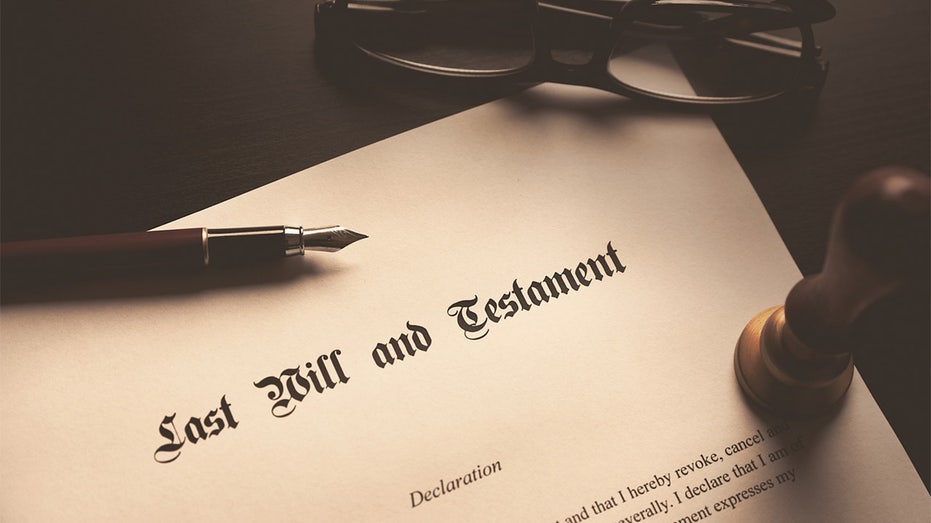Do I really need a will?
A will is a good investment that will save your loved ones time, money and stress down the road
Having endured the passing of both of my parents and having created a legacy and wishes planning product, one question that I get asked frequently is, “Do I need a will?” If you are over the age of 30, married or in a long-term partnership or if you have children, the answer is an emphatic, “Yes.”
A will is a formal, legal document that puts forth your wishes on how you want your assets divided and other wishes carried out after you pass.
UNDER TRUMP, AMERICANS' ECONOMIC OPTIMISM HITS HIGHEST LEVEL SINCE 1999
Whether you have a large estate or just some sentimental items, having a will is incredibly important. As Kelly Dancy, an attorney at Walny Legal Group says, “A will…can clearly lay out one's wishes about how assets should be transferred upon their death. By clearly communicating this before one passes, it limits any confusion about the decedent's intentions, reduces the likelihood of fighting among heirs and provides for a more efficient administration. It is more cost-effective to plan now rather than have the family figure it out after one's death. I have seen families torn apart over their parent's failure to plan.”

And that gets to the crux of the issue. Your legacy, when you pass away, isn’t the money or other assets you leave behind—it is leaving your family intact as allies instead of adversaries. The more planning you do upfront, the more of a burden you remove from your family members in the future.
US HOUSEHOLD DEBT TOPS $14T, REACHES NEW RECORD
Also, if you don’t have a will, the state will decide what happens with your assets. As Sheri E. Warsh, a partner at Levenfeld Pearlstein, LLC says, “When a person dies without a will, state law dictates who will receive the decedent’s assets. Individuals assume that, upon death, all assets will automatically pass to a surviving spouse. In most states, this is not true.”
Each state has its own rules and if you want assets to pass to people other than your spouse and children and in a certain manner, you had better lay out your wishes clearly and legally.
Your legacy, when you pass away, isn’t the money or other assets you leave behind—it is leaving your family intact as allies instead of adversaries.
While people often think that a will is only relevant when you are older, if you have minor children it is a necessity. As Sheri Warsh explains, “A will is generally the document used for designating a guardian for minor children. A guardian is the person who has legal responsibility for a child when both parents are deceased. They make decisions about a minor child’s health, schooling and religious upbringing. If you don’t have a document designating your preference for a guardian, a judge-- a complete stranger-- will decide who is responsible for your minor children with no input from you.”
GET FOX BUSINESS ON THE GO BY CLICKING HERE
As to whether or not you need a lawyer to prepare your will for you, we advise customers of Future File to use an estate planning lawyer. Each state varies in its rules and laws, which can be further complicated if you have dual residences. An estate planning attorney can make sure you have all the necessary legal requirements to ensure your will is valid and enforceable, including getting it witnessed and notarized. It is a good investment that will save your loved ones time, money and stress down the road.

But, don’t stop there in your legacy and wishes planning. One of the biggest mistakes that exists is people not being able to find the will, or finding multiple conflicting wills (remember Aretha Franklin and her multiple handwritten wills saga?)
At Future File, we advise using a legacy and wishes planning system to help you to organize all of your information and have a clear location for your loved ones to find the will.
If you want to be less formal, still make sure that they know where to locate it, as well as the contact information for your estate planning attorney.
Going through a legacy and wishes planning system is inexpensive and can also prompt you to remember to check other assets where you may have a beneficiary that is in conflict with your will.
If your life insurance policy, for example, designates an ex-spouse as the beneficiary, no matter what you put in your will, the ex-spouse will end up with the policy. So, you need to be thorough in your process.
And, Kelly Dancy suggests that you have other relevant estate planning documents in place. She explains, “An estate plan consists of not only a will, but also ancillary documents including powers of attorney for financial and healthcare, HIPAA Waivers, and, for many clients, a revocable trust. If there are no documents, issues can arise upon one's incapacity, as no one can act on their behalf.”
While it isn’t a fun topic to think about, getting a will and organizing your wishes and information is an exercise that takes the burden off your loved ones in their greatest time of need. If you don’t have one yet, get it done right away.
Carol Roth is the creator of the Future File legacy planning system, a “recovering” investment banker, host of "The Roth Effect" podcast and the New York Times bestselling author of "The Entrepreneur Equation." Click here to read more.




















